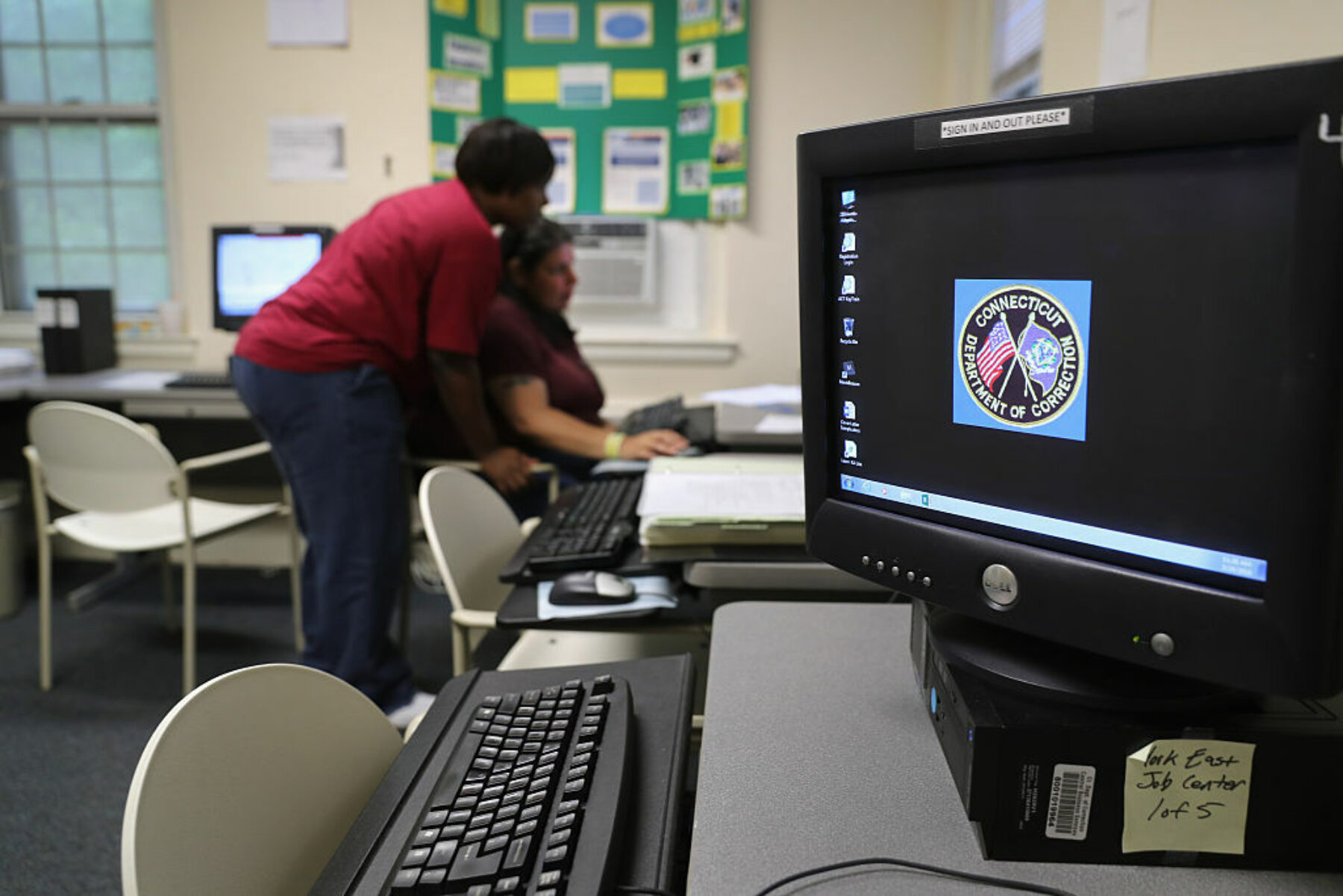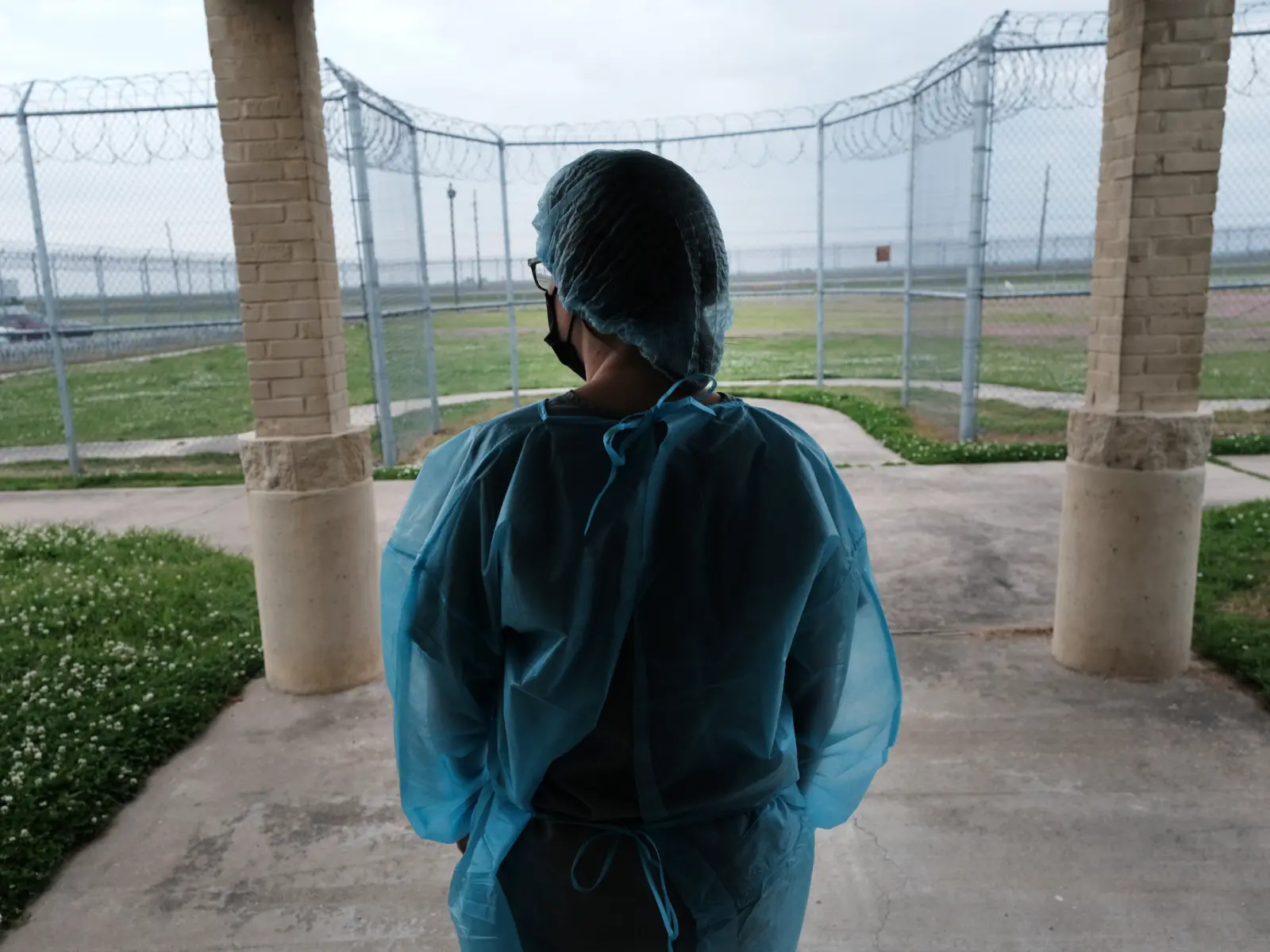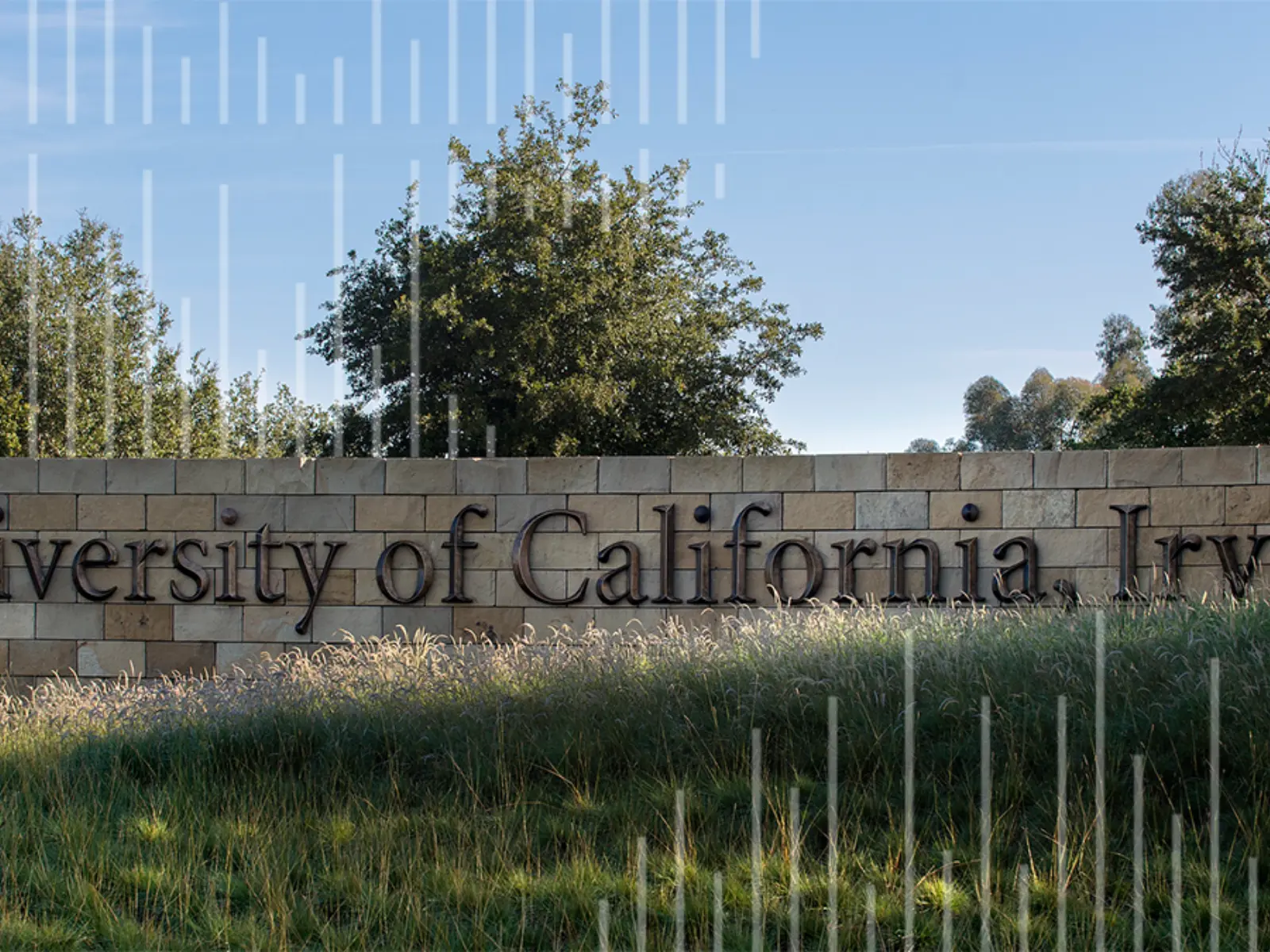Veronica Pearson, CEO of Dammi Media, a small business based in Charlotte, North Carolina, makes a practice of hiring people with criminal records.
That’s because she sees that justice-involved people in her community, many of whom are Black, face tremendous barriers to employment when reentering society — and she wants to help.
“It’s up to the business owners in the community to give them a second chance,” Pearson says.
In order to help her employ returning citizens, Pearson has secured a number of grants, including an award from Grow with Google that supports Rebrand Black, an initiative that she launched to teach digital skills to people impacted by incarceration.
Pearson has often contracted with Marlin Goodwin, a film and video producer who owns his own business. In 1992, while he was still a teenager, Goodwin was convicted of a robbery. He spent 10 months in prison and five years on parole.
“With my background, it was very challenging to find a job,” Goodwin says. He spent years in and out of work, often skipping the portion of job applications that asked about past convictions, before he formed his company in 2008. His partnership with Pearson has helped him grow his business.
Around 1 in 3 people in the U.S. currently has a criminal record, and those records disproportionately affect Black Americans. Criminal records can follow people long after they are arrested, convicted, or released from prison and often become barriers to accessing employment, housing, financial services, and other basic needs. Employers in particular may reject applications based on those histories, and in many states people with criminal records are barred from obtaining certain occupational licenses, such as those needed to cut hair or become an electrician.
If you can’t get a job when you come out of prison, the likelihood of recidivating is going to go way up.Hugh Hurwitz former director of the Federal Bureau of Prisons
“If you can’t get a job when you come out of prison, the likelihood of recidivating is going to go way up,” says Hugh Hurwitz, former director of the Federal Bureau of Prisons. “Too often now, we take people who have actually been trained for something and have a skill and tell them they can’t use it.”
In 2017, the Prison Fellowship, a Christian nonprofit working to reimagine America’s criminal justice system and restore the people it affects, designated April as Second Chance Month, an effort to raise awareness of challenges that justice-impacted people face and create momentum for policy changes that smooth their process of reintegration. With support from Arnold Ventures, the Prison Fellowship and many other organizations are assisting state efforts to expand second chances through a range of laws that automatically clear criminal records, reduce limitations on professional licensing, and review long sentences. In many cases, these efforts unite criminal justice reformers with allies like corrections officials, faith groups, fiscal conservatives, and business owners like Pearson.
“We love having a big tent of partners,” says Kate Trammell, vice president of advocacy for the Prison Fellowship. “That is one of the most dynamic things about Second Chance Month. We now have more than 800 partners, many of which are supported by Arnold Ventures, and all of them offer important perspectives from both sides of the aisle.”
Clean Slate Laws Are ‘About Public Safety’
While many states already have procedures in place for record clearing or expungement, most are not automatic and require people to actively petition. People who are unaware of this option or unable to access it may find their criminal records impeding their livelihood. In response, advocates across the country are working to advance state-level “clean slate” laws, which automatically clear people’s criminal records after a predetermined amount of time.
A diverse coalition of stakeholders successfully passed the nation’s first clean slate law in 2017 in Pennsylvania. Justice Action Network (JAN), a national bipartisan organization that advocates for criminal justice reform, worked with local advocates to advance the legislation, and supporters included progressives and conservatives, business leaders, justice-involved people and families, prosecutors, faith leaders, labor unions, and local sports franchises.
“Focusing on this issue is about public safety,” says Lauren Krisai, deputy director of JAN. “If you make it easier for people to get a job, that improves safety.”
The law went into effect in June 2018, automatically clearing the criminal records of people convicted of certain misdemeanors who have been conviction-free for 10 years, as well as people whose charges did not result in convictions. The state has now cleared over 40 million cases, more than half of the charges in the court’s database, and 1.2 million Pennsylvanians have benefited. In 2021, an amendment to the law eliminated court fines and fees as a barrier to record clearing. Today, advocates are pursuing further legislation that makes some felony convictions eligible for automatic record clearing.
Nine other states have passed clean slate laws, and momentum on this policy continues to grow. This work is supported by the Clean Slate Initiative, a new national organization that builds advocacy campaigns aimed at passing clean slate laws in states and in Congress. The organization is working with a variety of local, state, and national partners, including JAN and the Responsible Business Initiative for Justice (RBIJ), to make the justice and business case for reform. In 2022, these organizations supported a coalition of more than 40 businesses and nonprofits in Colorado, leading to the passage of a clean slate law that automatically clears arrest records that don’t result in a conviction, as well as certain older criminal records, including some low-level felonies.
“The business voice is impactful, because we know legislators are highly responsive to business leaders,” says Maha Jweied, co-CEO of RBIJ. “It also neutralizes any sense of partisanship.”
Similarly diverse coalitions are advancing clean slate legislation in many states this legislative session, including Illinois, Kentucky, Minnesota, Missouri, Oregon, and Texas.
Occupational Licensing Is ‘a Bigger Issue Than People Realize’
The Council of State Governments (CSG) Justice Center is also involved in expanding opportunities for justice-involved people by helping states advance occupational licensing reform. Many states give professional licensing boards broad authority to deny people licenses due to past convictions, blocking justice-involved people from dozens of professions ranging from barber to cosmetologist to security alarm technician. These barriers can be permanent, and they apply to any type of criminal record, including arrests that do not lead to a conviction.
“It’s a bigger issue than people realize,” says Joshua Gaines, project manager for corrections and reentry at the CSG Justice Center. “More than 20% of workers in the country require some sort of state credential to do their job.”
Through its Fair Chance Licensing Project, the CSG Justice Center has cataloged the landscape of licensing laws across the 50 states and provided close assistance to states that were interested in expanding opportunities for licensure. Several states — including Connecticut, Delaware, Louisiana, and Oklahoma — subsequently passed significant protections and reforms, including limiting or eliminating consideration of older convictions, youth convictions, and low-level crimes. Many also set up a framework for how people’s criminal histories are considered, ensuring that they are reviewed individually with attention to factors like rehabilitation, time elapsed, and the relationship of the crime to the license they are seeking.
Gaines notes that occupational licensing reform is a bipartisan issue. In Oklahoma, a Republican-dominated state, the CSG Justice Center, the Prison Fellowship, the Institute for Justice, and Americans for Prosperity worked closely together to change occupational licensing laws. Keeping formerly incarcerated people at the table, the Prison Fellowship deployed its advocacy team and local “justice ambassador” volunteers to lobby state lawmakers and equipped local faith partners to join in.
“To look at a map of how these policies shake out, you would not have any indication that there’s a red-blue breakdown,” Gaines says. “Apart from arguments in favor of fair treatment and second chances, you’ve also got really solid economic arguments about allowing employers to choose. There’s something for everyone.”
‘Sentencing Review Provides a Safety Valve’
A related movement is advocating for second chances for people still incarcerated. A 2012 Supreme Court decision found it unconstitutional to sentence juveniles to life in prison without the possibility of parole, paving the way for jurisdictions to review such long sentences.

“We’re very good at throwing people away for long periods of time, but we don’t have enough mechanisms in place to revisit the extraordinary sentences we give people, especially juveniles,” says Kevin Ring, president of Families Against Mandatory Minimums (FAMM). Long sentences are not necessary, Ring explains, since when people sentenced to life as juveniles are released, their recidivism rate is close to zero.
FAMM is an organization that challenges mandatory sentencing laws. Recently, the group helped to support a grassroots campaign in New Mexico to end juvenile life without parole, providing assistance through lobbying, testifying in support of the bill, and creating a hotline for New Mexico residents to call the governor. In March, Gov. Michelle Lujan Grisham signed that bill into law. Ring notes that the organization is also supporting an upcoming New Mexico bill to establish compassionate release in the state, which would allow geriatric parole for people after age 55.
Because these efforts emphasize not only safety and fairness but also economic opportunity, they are often bipartisan, Ring notes. For example, a bill pending in the Texas legislature would provide a second look to juvenile offenders, and Right on Crime, a conservative criminal justice reform organization, supports it.
The Second Look Project has assisted FAMM and local organizers in their efforts in places like New Mexico and Texas. The Washington, D.C., organization was founded in 2020 to assist incarcerated people through the Second Look Act, a 2016 local D.C. law that makes people eligible for resentencing if they have served 20 years in prison for crimes they committed before the age of 18.
Second look sentencing review provides a safety valve and a measure of flexibility to what were historically very rigid sentencing practices that impose extremely long sentences.James Zeigler founder and co-executive director of the Second Look Project
“Second look sentencing review provides a safety valve and a measure of flexibility to what were historically very rigid sentencing practices that impose extremely long sentences,” says James Zeigler, founder and co-executive director of the Second Look Project. “Giving people the opportunity to come home, once they’ve demonstrated that they are deserving, not only restores families and communities that have been fractured as a result of mass incarceration but also returns people to the community who are motivated and well-equipped to improve things.”
In recent years, local lawmakers have passed amendments to the Second Look Act that expand eligibility for sentencing review to people who have served 15 years in prison and were sentenced before the age of 25.
“People really do have a capacity for growth, rehabilitation, and transformation,” Zeigler says. “The more formerly incarcerated people come home and share their stories, the more people across the political spectrum will begin to accept that.”
Other jurisdictions have focused on reforming community supervision requirements. Advocates at Partnership for Safety and Justice are working in coalition with local and statewide organizations to advance an “earned discharge” bill that would reduce Oregon residents’ time served on probation and parole by up to half, based on good behavior. If passed, the law would benefit some 5,000 people, about a quarter of those on community supervision in the state.
“Earned discharge is an example of a second chance,” says Babak Zolfaghari-Azar, senior policy manager at Safety and Justice Oregon. “People deserve that. They’re working toward that. Ultimately, including these kinds of checkpoints in the criminal justice system is what will promote community safety and racial justice.”
‘This Isn’t Just a Political Exercise’
Like a growing number of small business owners, Veronica Pearson sees that people with criminal records possess enormous potential to improve their communities.
“When you make barriers to people’s employment, it’s not good for the economy,” Pearson says. “But when you allow them to utilize and harness what they already know, you can have productive citizens. You can have way more people filling employment gaps if you train them and allow them to work.”
More and more states are seeing the wisdom in this point of view, and momentum is building for policies that extend redemption to people who have made mistakes in the past. Second Chance Month began as a piece of paper on a desk in 2017, Trammell recalls. It has grown to be a widespread campaign reaching the public and the highest levels of government — and having significant impact on improving people’s life opportunities.
“Being able to leverage a movement like this to focus on impact is critical, and it gives me a lot of hope,” Trammell says. “This isn’t just a political exercise, and it’s not just a public awareness campaign. It’s a real proposition of what we believe about people’s potential.”




















